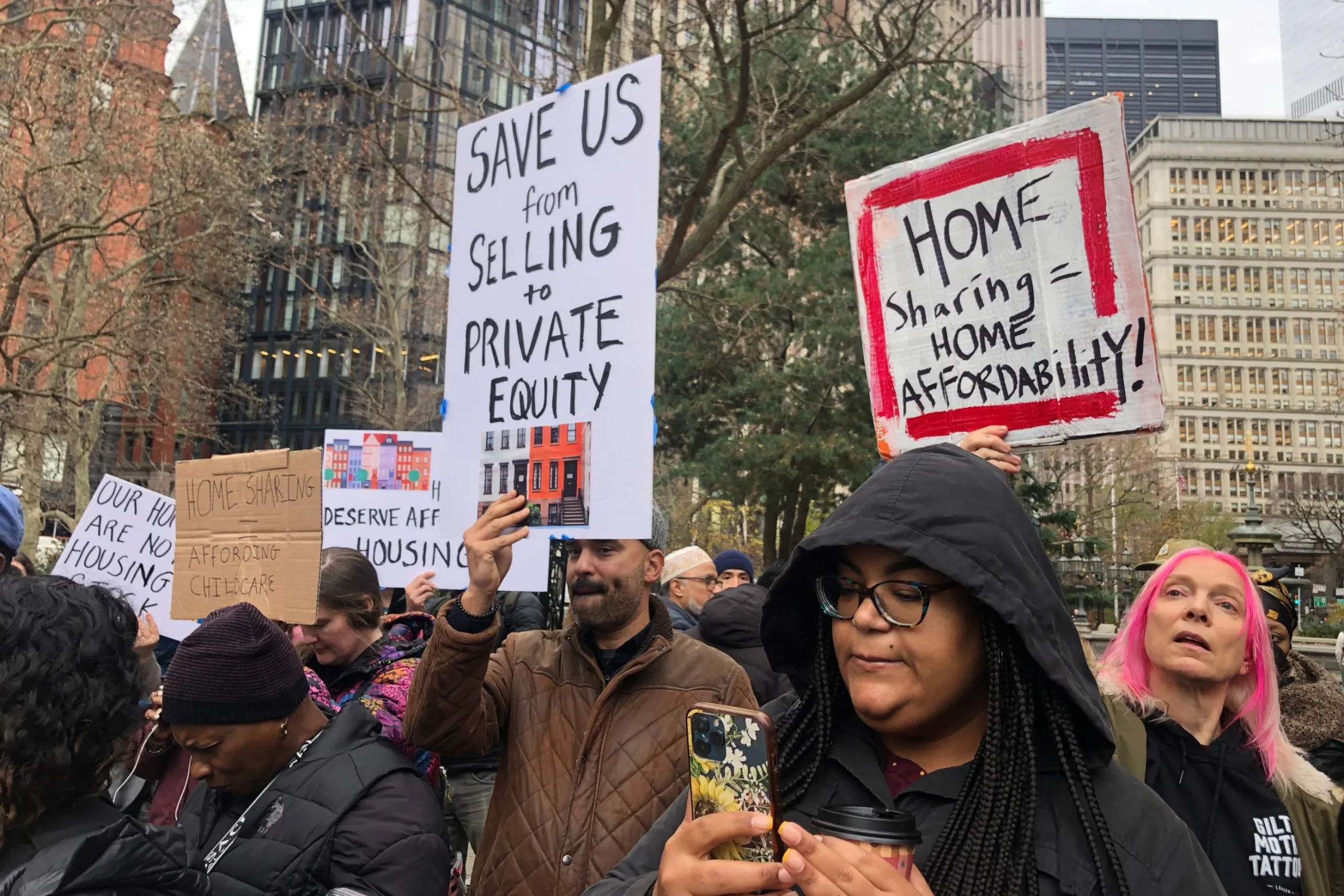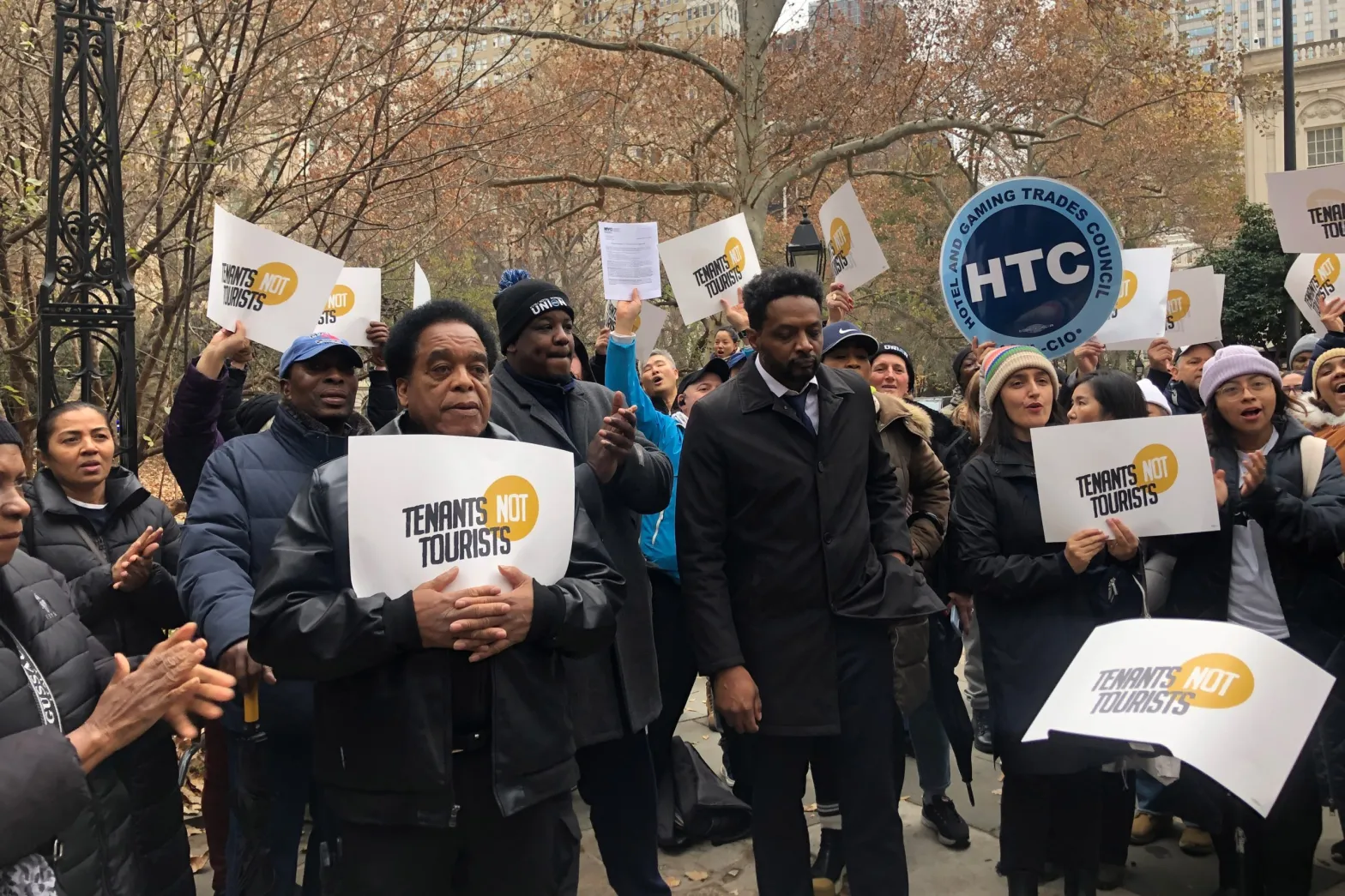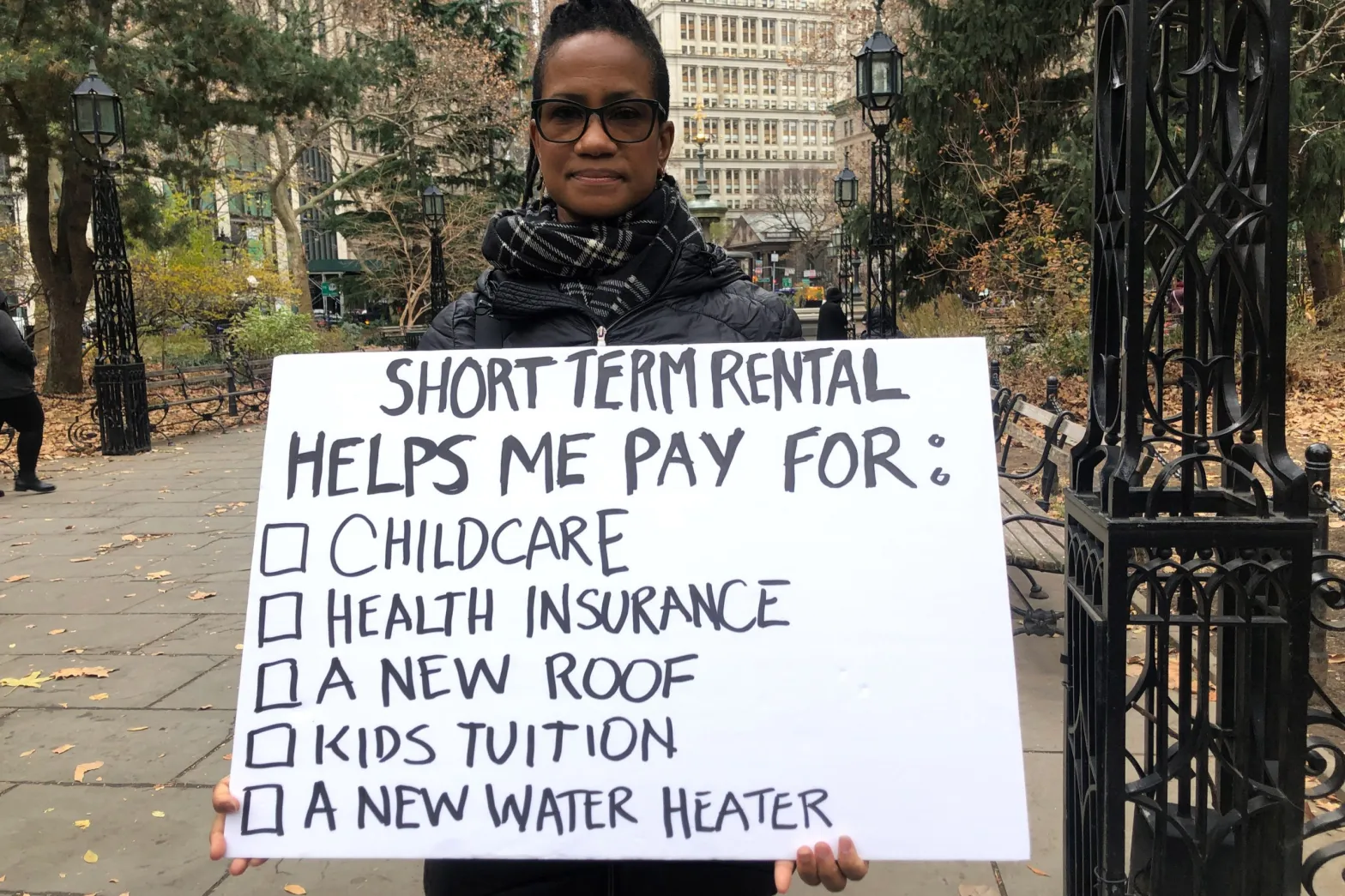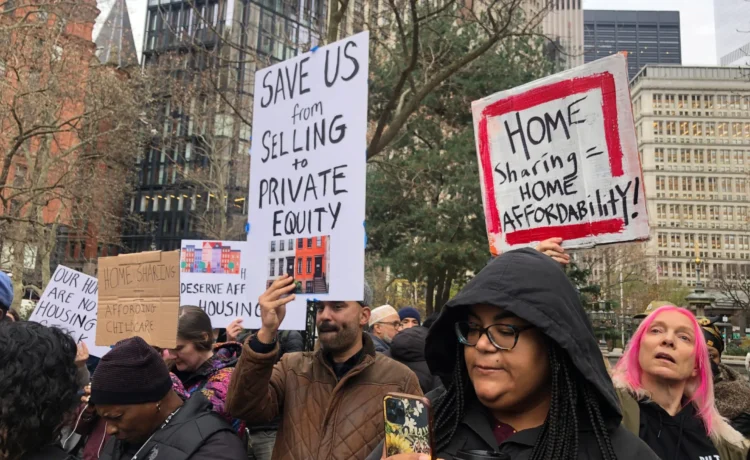Yves here. AirBnB is very much a class warfare issue. In cities with chronically tight rental markets, like New York City and San Francisco, there are investors who have purchased apartments solely for the purpose of leasing them on a short-term basis, and thus reducing the supply available to residents. Some AirBnB landlords contend they need the additional income to be able to hang on to the property as a primary residence. It seems likely that AirBnB has rounded up as many of this type of lessor as possible to put a good face on its end-run of hotel regulations, much the same way large banks round up community banks to lobby for breaks that benefit the big fish too.
Some may contend that home owners should have the right to as they see fit on their properties. But that is a false view. Living in a community and enjoying its services (police and fire department protection, garbage collection, ability to enroll children in public schools, and frankly enjoying its zoning rules, designed to preserve the value of local real estate) also entails obligations, and that includes adhering to community positions on transients. The last community I lived in completely barred rentals of less than 30 days. Other rules included outlawing the removal of trees over a certain size without hiring a professional arborist and extensive business licensing requirements.
As the article notes, one constituency opposing re-liberalization of AirBnB rules in New York City is hotel workers (and clearly owners). In other areas of the US, AirBnB rentals are falling out of favor due to gotcha high cleaning charges. But NYC is such a chronically expensive city for hotels that AirBnB is apparently still competitive.
By Samantha Maldonado, a senior reporter for THE CITY, where she covers climate, resiliency, housing and development. Published Dec. 9, 2024 by THE CITY
 Pro and anti-Airbnb demonstrators clashed in City Hall Park after a bill was introduced in the City Council to make it easier for some homeowners to provide short-term rentals, Dec. 9, 2024. Credit: Samantha Maldonado/THE CITY
Pro and anti-Airbnb demonstrators clashed in City Hall Park after a bill was introduced in the City Council to make it easier for some homeowners to provide short-term rentals, Dec. 9, 2024. Credit: Samantha Maldonado/THE CITY
Rival rallies over proposed relief of restrictions on Airbnb and other short-term rental platforms faced off at City Hall Park Monday, playing out a live debate in front of the home of the City Council that will ultimately have to pick a side.
On one side was the newly launched “Tenants not Tourists” Coalition, made up of groups that included the Crown Heights Tenants Union, Tenants PAC and Make the Road New York, along with the Hotel and Gaming Trades Council. They were there to protest a City Council bill introduced last month that would allow owners of one- and two-family homes to use their properties as short-term rentals.
On the other side, homeowners, many former Airbnb hosts, held signs in support of the bill. They said that short-term rentals allowed them to afford rising expenses for maintaining their properties and gave them power and stability.
Chants that started with the tenant and union demonstrators echoed into call-and-response-style interactions between opposing sides.
 Tenant-rights advocates and hotel union members rally at City Hall Park against a bill that would make it easier for some homeowners to have short-term rentals like Airbnb, Dec. 9, 2024. Credit: Samantha Maldonado/THE CITY
Tenant-rights advocates and hotel union members rally at City Hall Park against a bill that would make it easier for some homeowners to have short-term rentals like Airbnb, Dec. 9, 2024. Credit: Samantha Maldonado/THE CITY
“Housing is a human right!” the tenants and hotel group chanted.
“We agree with you!” came shouts from the other side.
“People over profit!” the tenants and union members chanted.
“Are we not people?” came the response from the homeowners’ side.
Members of each side had argumentative standoffs with their counterparts.
“It’s a little intense right now,” said Whitney Hu, director of civic engagement for Churches United for Fair Housing, addressing the crowd after having a heated one-on-one conversation with a homeowner. “We’re all mad, we’re all frustrated. Those in power have not seen our pain. They haven’t seen our grief. They haven’t seen that some of us have made really, really hard decisions.”
“I can agree with that,” said Mo Oliver, a Bedford-Stuyvesant homeowner who had been speaking with Hu. He said he had paid his bills by Airbnbing his home after losing his job during the pandemic.
“At the end of the day, all we want, I think all of us can agree, is a New York City that centers us, a New York City where we can wake up, pay the bills, send our kids to school, pay rent on time, pay our mortgages on time,” Hu said. “The people we are fighting are the ones who have the money.”
Murmurs throughout the crowd revealed differences in who attendees thought the moneyed interests were: companies like Airbnb or the hotel lobby.
Revisiting Restrictions
Starting in 2023, New York City Local Law 18 has barred property owners from renting out a whole house or apartment to guests for fewer than 30 days. After registering with the Mayor’s Office of Special Enforcement, they may only rent to up to two guests sharing their space, such as in an extra bedroom.
The new law got rid of thousands of short-term rentals across the boroughs — a 92% drop, according to a studycommissioned by Airbnb.
 Sunset Park homeowner Gia Sharp rallied in City Hall Park in favor of allowing short-term rentals like Airbnb, Dec. 9, 2024. Credit: Samantha Maldonado/THE CITY
Sunset Park homeowner Gia Sharp rallied in City Hall Park in favor of allowing short-term rentals like Airbnb, Dec. 9, 2024. Credit: Samantha Maldonado/THE CITY
Councilmember Farah Louis’ bill, Intro. 1107, would allow for rentals of less than 30 days in one- and two-family houses, increasing the number of guests allowed to stay from two to four adults, plus their children. Under the bill, the primary occupants would not need to be present during the guests’ stay, so they could rent space while on vacation, but would still need to register with the city. The hosts may also install locks internally to restrict guests from certain rooms, closets or drawers.
For many, short-term rental income has become a vital resource to help cover these escalating mortgage costs,” Louis (D-Brooklyn) said at a November Council meeting. “These homeowners pursuing the American dream are being held back by a policy that treats them as if they are commercial enterprises.”
Airbnb, which has spent over a million dollars this year on local lobbying, said the 2023 law didn’t do much to alleviate the housing crisis or expense of renting in New York City, while helping fuel a spike in hotel prices.
“This bill aims to fix an overly restrictive short-term rental law that, in the last year, has failed to decrease rents in NYC and only increased hotel rates exorbitantly for travelers,” said Nathan Rothman, Airbnb’s director of policy, in a statement. “It’s time to fix a broken law that hasn’t helped housing but has padded hotel industry pockets at everyone else’s expense.”
In an email, Vijay Dandapani, president and CEO of the Hotel Association of New York City, called the claim that the short-term rental restriction law resulted in higher hotel rates is “a fiction peddled actively by Airbnb.” He added that hotel rates, adjusted for inflation, did not recover to 2019 levels until September, and government action to enable more youth hostels could give tourists more affordable options.
The tenants and hotel unions said Airbnb restrictions put more housing stock on the rental market for long-term New York tenants — essential given the city’s housing shortage. The restrictions on short-term rentals were thought to be a boon for hotels, which competed with them.
Many homeowners, on the other hand, said they longed for the flexibility and income of renting an extra apartment in their rowhomes. They were able to host family members as well as visitors, but with the ban, their income streams petered out.
Of course, some property owners still advertise stays for less than 30 days on websites like Craigslist and Facebook Marketplace.
And to be sure, some former Airbnb hosts turned their former short-term rentals into long-term housing for locals. Streeteasy listed many apartments with descriptions specifying they used to be Airbnbs, or the owners had planned them to be.
Gia Sharp, a consultant and co-founder of the group Restore Homeowner Autonomy and Rights, or RHOAR, switched to hosting long-term guests — those who stay for over 30 days — in her two-family Sunset Park home after the law restricting short-terms went into effect.
She liked short-term stays so she could rent out her extra unit when she didn’t have family staying with her from out of town, and the extra income helped with maintenance expenses.
Sharp said she was open to conversations about amending the bill so that it would specify properties must be owner-occupied in order to have short-term guests — discouraging companies from buying up housing to rent it out to travelers.
“Local Law 18 is good for the majority, but it went too far,” Sharp said. “I think that tenants’ rights are completely valid, and we’re on the same side. We want housing affordability, but we’ve been pitted against each other, and it’s a divide and conquer narrative that we’re not here for. But we want to make sure that everyone understands what this bill really does: it’s really helping homeowners, helping New Yorkers.”
But Darius Khalil Gordon, executive director of the tenant group Met Council on Housing, said he was opposed to any legislation that might create an opening for predatory practices.
“Airbnbs and corporations like Airbnb will actually use this as a guise for one-and two-family houses,” he said, “but they know they’re gonna come in, buy all these apartments, jack up the rent, jack up whatever it is, and just make profit.”














